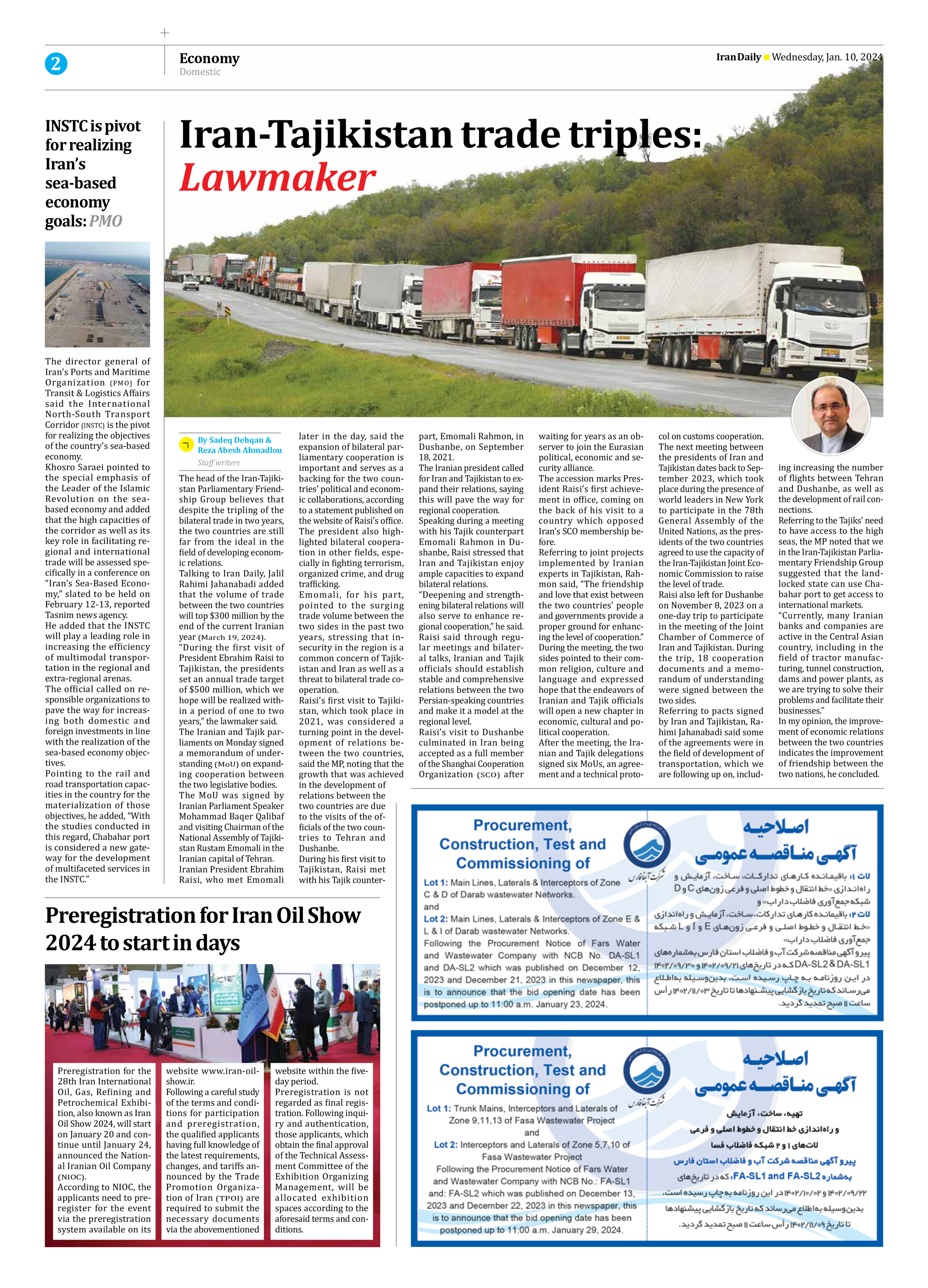
Iran-Tajikistan trade triples: Lawmaker
By Sadeq Dehqan & Reza Abesh Ahmadlou
Staff writers
The head of the Iran-Tajikistan Parliamentary Friendship Group believes that despite the tripling of the bilateral trade in two years, the two countries are still far from the ideal in the field of developing economic relations.
Talking to Iran Daily, Jalil Rahimi Jahanabadi added that the volume of trade between the two countries will top $300 million by the end of the current Iranian year (March 19, 2024).
“During the first visit of President Ebrahim Raisi to Tajikistan, the presidents set an annual trade target of $500 million, which we hope will be realized within a period of one to two years,” the lawmaker said.
The Iranian and Tajik parliaments on Monday signed a memorandum of understanding (MoU) on expanding cooperation between the two legislative bodies.
The MoU was signed by Iranian Parliament Speaker Mohammad Baqer Qalibaf and visiting Chairman of the National Assembly of Tajikistan Rustam Emomali in the Iranian capital of Tehran.
Iranian President Ebrahim Raisi, who met Emomali later in the day, said the expansion of bilateral parliamentary cooperation is important and serves as a backing for the two countries’ political and economic collaborations, according to a statement published on the website of Raisi’s office.
The president also highlighted bilateral cooperation in other fields, especially in fighting terrorism, organized crime, and drug trafficking.
Emomali, for his part, pointed to the surging trade volume between the two sides in the past two years, stressing that insecurity in the region is a common concern of Tajikistan and Iran as well as a threat to bilateral trade cooperation.
Raisi’s first visit to Tajikistan, which took place in 2021, was considered a turning point in the development of relations between the two countries, said the MP, noting that the growth that was achieved in the development of relations between the two countries are due to the visits of the officials of the two countries to Tehran and Dushanbe.
During his first visit to Tajikistan, Raisi met with his Tajik counterpart, Emomali Rahmon, in Dushanbe, on September 18, 2021.
The Iranian president called for Iran and Tajikistan to expand their relations, saying this will pave the way for regional cooperation.
Speaking during a meeting with his Tajik counterpart Emomali Rahmon in Dushanbe, Raisi stressed that Iran and Tajikistan enjoy ample capacities to expand bilateral relations.
“Deepening and strengthening bilateral relations will also serve to enhance regional cooperation,” he said.
Raisi said through regular meetings and bilateral talks, Iranian and Tajik officials should establish stable and comprehensive relations between the two Persian-speaking countries and make it a model at the regional level.
Raisi’s visit to Dushanbe culminated in Iran being accepted as a full member of the Shanghai Cooperation Organization (SCO) after waiting for years as an observer to join the Eurasian political, economic and security alliance.
The accession marks President Raisi’s first achievement in office, coming on the back of his visit to a country which opposed Iran’s SCO membership before.
Referring to joint projects implemented by Iranian experts in Tajikistan, Rahmon said, “The friendship and love that exist between the two countries’ people and governments provide a proper ground for enhancing the level of cooperation.”
During the meeting, the two sides pointed to their common religion, culture and language and expressed hope that the endeavors of Iranian and Tajik officials will open a new chapter in economic, cultural and political cooperation.
After the meeting, the Iranian and Tajik delegations signed six MoUs, an agreement and a technical protocol on customs cooperation.
The next meeting between the presidents of Iran and Tajikistan dates back to September 2023, which took place during the presence of world leaders in New York to participate in the 78th General Assembly of the United Nations, as the presidents of the two countries agreed to use the capacity of the Iran-Tajikistan Joint Economic Commission to raise the level of trade.
Raisi also left for Dushanbe on November 8, 2023 on a one-day trip to participate in the meeting of the Joint Chamber of Commerce of Iran and Tajikistan. During the trip, 18 cooperation documents and a memorandum of understanding were signed between the two sides.
Referring to pacts signed by Iran and Tajikistan, Rahimi Jahanabadi said some of the agreements were in the field of development of transportation, which we are following up on, including increasing the number of flights between Tehran and Dushanbe, as well as the development of rail connections.
Referring to the Tajiks’ need to have access to the high seas, the MP noted that we in the Iran-Tajikistan Parliamentary Friendship Group suggested that the landlocked state can use Chabahar port to get access to international markets.
“Currently, many Iranian banks and companies are active in the Central Asian country, including in the field of tractor manufacturing, tunnel construction, dams and power plants, as we are trying to solve their problems and facilitate their businesses.”
In my opinion, the improvement of economic relations between the two countries indicates the improvement of friendship between the two nations, he concluded.







